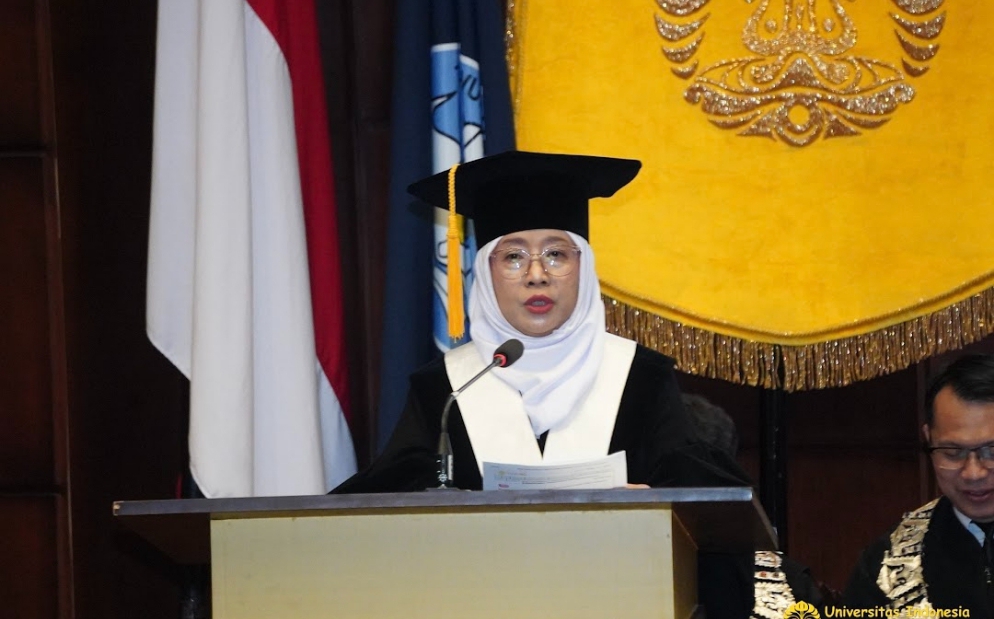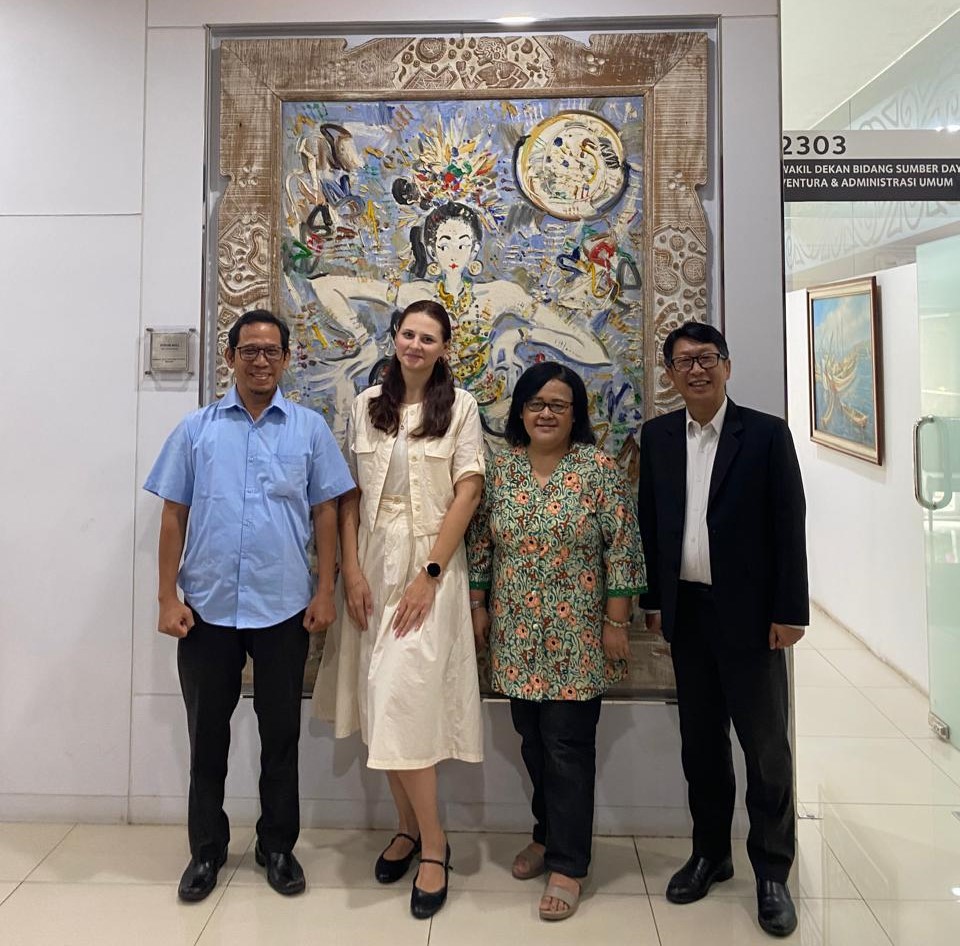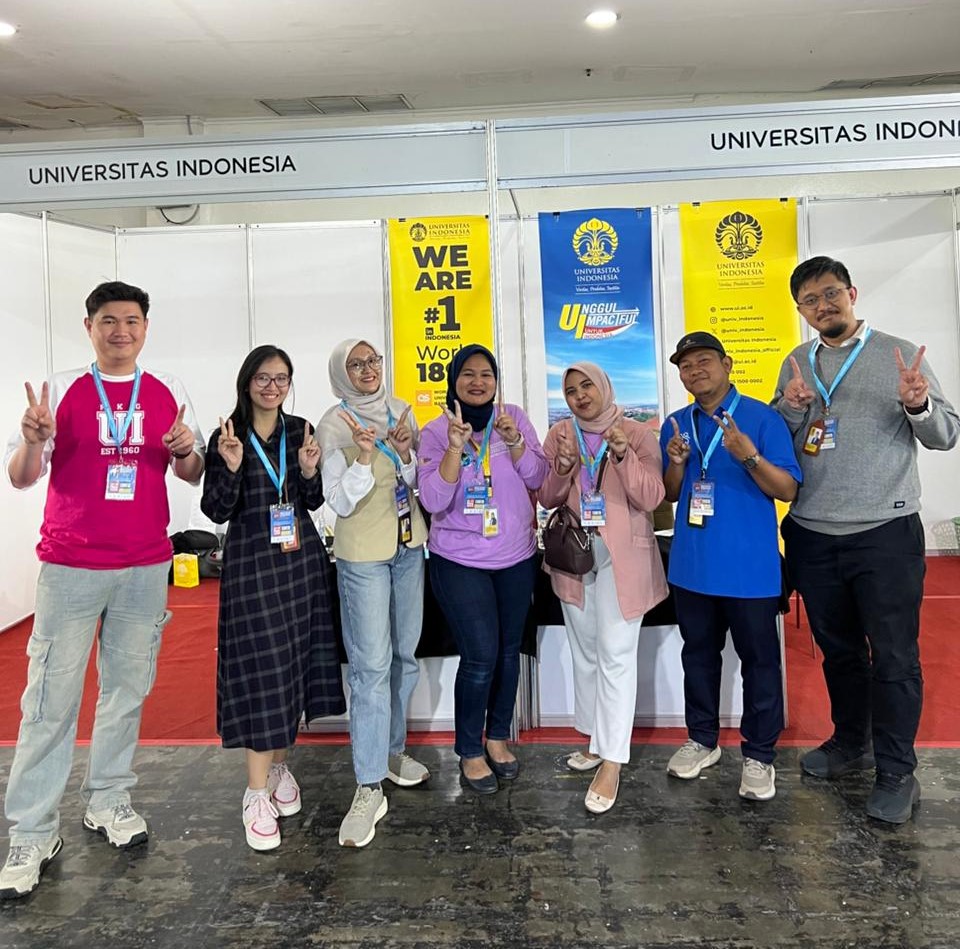Depok, August 6, 2025 – In the sacred moment of her inauguration as Professor of the Universitas Indonesia, Prof. Dr. Laksmi, S.S., M.A. delivered a scientific speech that raised collective awareness about one of the most fundamental and urgent issues in Indonesia: the crisis of intellectual capital at various levels of the organization. In her speech titled “Information Culture as a Strategy to Overcome the Intellectual Capital Crisis in Organizations”, Prof. Laksmi emphasized that weak knowledge management, information systems, and collaboration in public and private institutions have led to various crises that have a wide impact on society. She asserted that organizations may have resources, but without good management of intellectual capital – i.e. knowledge, skills, systems, and effective networks – they will be fragile in facing the changes and challenges of the times. She made this statement in front of academics, students, and invited guests who filled the UI Council Hall.
In her scientific presentation, Prof. Laksmi dissected the intellectual capital crisis into three main aspects: human capital, structural capital, and relational capital, which in this context, the three work intertwined to construct information culture. She presented various case studies and empirical data that showed the direct impact of weak utilization of intellectual capital on the decline in organizational performance, failure of public policy, and loss of public trust in institutions. In the human capital crisis, she highlighted the case of a government spokesperson who issued a disparaging statement against threatening symbols addressed to journalists. According to her, the inability to understand symbolic meaning in public communication reflects weak information literacy in the sphere of power. Meanwhile, on the structural capital crisis, she mentioned the case of the failure of thousands of students to enter universities through the achievement pathway due to negligent data input by schools. Prof. Laksmi believes that this problem reflects the failure of the information system that not only hampers the administrative process, but also destroys the hopes of the younger generation. On the relational capital crisis aspect, she highlighted the revision process of the TNI Law that was carried out without involving the public and academics, which in her opinion shows the fragility of public trust and the declining commitment to transparency and democracy in the formulation of state policies.
In response to this multidimensional crisis, Prof. Laksmi offers information culture as a strategic approach to restore and strengthen the organizational ecosystem. She explains that information culture is not just about technology or data collection, but includes values, norms and practices in creating, using and disseminating information responsibly and critically within the organization. In h view, information is not just stored data, but the heart of organizational life. If the flow of information is blocked, the organization will lose thinking power, lose responsiveness, and even lose resilience. She likens the role of information to the flow of blood in the human body-something vital that determines survival.
In that context, Prof. Laksmi underlined the need to build a documented knowledge management system both explicitly and tacitly, create an open and transparent communication space in the work environment, and adopt information and communication technology (ICT) in a relevant and contextual manner according to organizational needs. She also emphasized the importance of making the organization a living learning space – constantly evaluating work practices, reflecting on experiences, and transforming itself from time to time. For her, information culture is the key for organizations to be resilient, innovative and adaptive in the midst of a changing world landscape.
Closing her speech, Prof. Laksmi invited all parties – from the education sector, government, public services, to the private sector – to start the change from within their respective organizations. She emphasized that building an information culture is not an overnight job, but a long-term investment that will determine the competitiveness and sustainability of the institution. He invited the audience to reflect on how the organization currently manages information: whether it has been wise in utilizing it, whether it has opened a space for healthy dialogue, and whether information has become the foundation for decision-making. In closing, he quoted the Dalai Lama: “When you speak, you only repeat what you already know. But if you listen, you might learn something new.”
Prof. Dr. Laksmi is a long-time senior academic in the field of library science, information and culture. Her inauguration as Professor in the branch of Culture and Management of Information Institutions on Wednesday, July 6, 2025 was based on the Decree of the Minister of Education, Culture, Research and Technology dated April 11, 2025 number 551/M/KPT.KP/2025 concerning the promotion of lecturer academic positions.
The theme raised in the scientific oration of the inaugural professor is in accordance with Prof. Laksmi’s background as a lecturer at the Department of Library and Information Science (DIPI) FIB UI. She completed her undergraduate degree at the University of Indonesia in 1990 in the French Literature study program and continued her master’s studies in Library Science at the University of Sheffield, UK and graduated in 1993. She earned her Doctorate degree in 2010 in Anthropology at the University of Indonesia. Prof. Laksmi served as Chair of the S1 Library Science Study Program in 2016-2020, Chair of the Department of Library and Information Science in 2011-2015, Chair of the S2 Library Science Study Program 2011-2015, and a member of the Academic Senate of FIB UI as an ex officio member in 2011-2015. In 2024, Prof. Laksmi was awarded the 2nd place award for lecturer with the most productive research in FIB UI. Some of her papers that have been published in the last five years in Scopus indexed journals include “The Role of Librarians Combatting Cultural Violence in the Library Environment” in the Library Leadership & Management journal (2025), “School librarian experience as an agent in fostering a reading culture” in the International Federation of Library Associations and Institutions journal (2024), “Health Information Behavior of Indonesians During the COVID-19 Pandemic: A Sensemaking Perspective“ in the Journal of Information Science Theory and Practice (2024), ”Social Adaptation through Digital Literacy among LIs. In 2024, Prof. Laksmi was awarded the 2nd place award for the lecturer with the most productive research at FIB UI. Some of her papers that have been published in the last five years in Scopus indexed journals include “The Role of Librarians Combatting Cultural Violence in the Library Environment” in the Library Leadership & Management journal (2025), “School librarian experience as an agent in fostering a reading culture” in the International Federation of Library Associations and Institutions journal (2024), “Health Information Behavior of Indonesians During the COVID-19 Pandemic: A Sensemaking Perspective“ in Journal of Information Science Theory and Practice (2024), ”Social Adaptation through Digital Literacy among LIS Students in Post-COVID-19 in Indonesia. “ in the Journal of Library and Information Studies (2024), and ”The readiness to implement digital humanities data curation of four institutional repositories in Indonesia” in the Digital Library Perspectives journal (2023). Several books and teaching materials published in 2024 include Information in the social and cultural context by Wedatama Widya Sastra publisher and Dep. of Library and Information Science FIB UI. Library and Information Science FIB UI, and book chapters in Trends and Dynamics of Library and Information Science Studies by BRIN publishers, and Librarian Profession published by the Open University.
Prof. Laksmi’s inauguration as Professor is not only a personal milestone in her academic journey, but also an important moment for the world of higher education in Indonesia to reflect on the vital role of information culture in responding to the challenges of the times.




